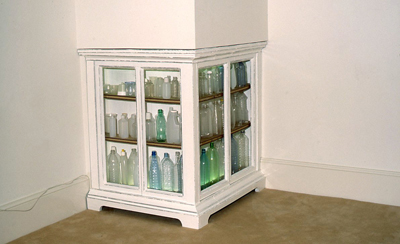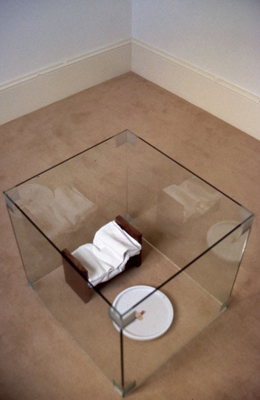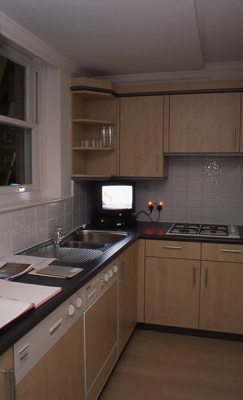Works Perfectly
Interiors - Deborah LevyRear Window Publications
1994 © Deborah Levy
“There are days,” she says, “when I just stare into the carpet. It is blue, the blue of the Mediterranean. There are places, near the television for example, where the blue deepens, and I am sucked, abducted into its dark centre. I am an alien in my own home, floating through the hyperspace of one hundred percent pure wool.”
Who is she, this mocking Madame Bovary, staring all day at her carpets? This suburban house frau cat-walking the white surgical aisles of hypermarkets clasping soap powder and pâté to her beautiful breasts as if they were Oscars?
Her gaze comes to him coloured by contact lenses pressed over her pupils like small lying saucers. When he looks down at the frayed cuffs of his suit, he feels guilty for bringing the virus of mortal agitation and turbulence into the white walls of her apartment.
“There are days,” she repeats, in the matter-of-fact voice of someone reading the label of a coffee jar, “when I look out of the window and want to go to sleep until the year 2000.”
Something glitters above her head. An invisible hairnet studded with a small galaxy of rhinestones.
“No one will miss me. My husband will play golf; our children will get chicken pox; the hypermarkets will order a new brand of something; the stores will struggles to meet their sales target; the jewellers, delicatessens and meat boutiques will open and close again. Verminous pigeons will be fed by the old. Tense young men will continue to wear denim. Betrayed women will fumble in their handbags for tissues.”
She walks to the freezer and takes out a square silver foil dish. “Three minutes for langoustines?”
He does not know and she does not really care.
“Before you attempt to describe my life back to me,” she murmurs, “I will describe my death wish to you. I would like to smash my head on the marble curve of a grand sweeping staircase. I would like to die next to the sound of water—a fountain for example. And I would like to die with the scent of scorched vanilla in the air. Most important of all, I want the person who finds me to sit in silence on one of the marble stairs and smoke a cigarette, hypnotised by the cascading fountain and the violence of hot blood on cold white stone. He or she will notice that the marble is veined, that my eyes are bruised and my skin is pale blue. She or he will weep because all of this is gruesome and beautiful and because it was a scheduled flight to death, a journey well planned.”
Her eyes seem to suck in the colour of the room, now slate grey, now burgundy, a cool Nouvelle Vague heroine describing her death as if reading the instructions on the back of a packet of cornflakes. She slides the foil dish into the microwave and reaches for one lone tin in the pristine white cupboard.
“Is this right?” she pauses and then, as if discouraged, puts the tin down again.
When she walks across the carpet towards a sleek black answer-machine, she thinks once again how she looks like a superstar without a camera; a president without a parliament; rock and roll without a microphone. She presses the Play button:
“Here are the phrases you will need for Berlin,” he says.
Wo ist die nächste Bank bitte?
Wo kann ich Reiseschecks einlösen?
Wann öffnet die Bank?
Können Sie mir auf der Karte Zeigen, who ich bin?
She looks up at him, smiling for the first time.
“Can you say it?” He makes his voice gentle and indifferent.
“Können Sie mir auf der Karte ziegen… who ich bin?”
“What does this mean?” He is impressed by her perfect pronunciation.
“It means now I am going to pull down the blinds and you are going to describe my life to me.”
For the first time this evening, he feels frightened.
He wraps his fingers around the pulse of his wrist and shuts his eyes. A boiler concealed somewhere in the building makes the sing-song sound of cicadas.
With extracts from The Unloved (Jonathan Cape, 1993)





